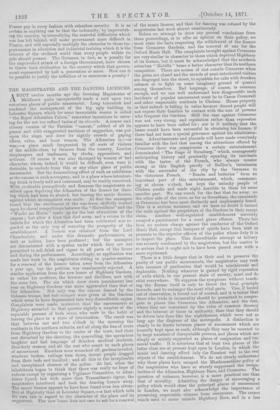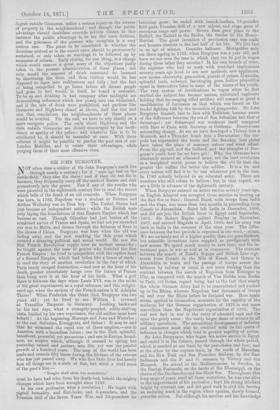THE MAGISTRATES AND THE DANCING LICENCES.
ABOUT twelve months ago the licensing Magistrates of Middlesex quite unexpectedly made a raid upon two notorious places of public amusement. Long toleratioh had rendered the management of the big ugly building in Leicester Square, which for some inscrutable reason is called " the Royal Alhambra Palace," somewhat incautious in cater- ing for the not too refined tastes of its clientele. A coarse and clumsy version of the Parisian " cancan," robbed of all its graces and with exaggerated nastiness of suggestion, was put upon the stage, and drew its nightly crowds of gaping idlers, rakes, and loose women. The Alhambra is,—or was,—a place much frequented by all sorts of visitors of the middle-class, by farmers from the country, London shopkeepers and tradesmen, by clerks, apprentices, and artizans. Of course it was also thronged by women of bad character, whom, indeed, it would be difficult, even were it desirable, to exclude from this or any other place of public amusement. But the demoralizing effect of such an exhibition as the cancan in such a company, and in a place where intoxicat- ing drink is freely sold and consumed, may be readily conceived. With creditable promptitude and firmness the magistrates re- solved upon depriving the Alhambra of the licence for danc- ing which had been so abused, but leaving the music licence, against which no complaint was made. At first the managers found that the excitement of the war-fever, skilfully worked upon by choral competitions between the "Marseillaise" and the " Wacht am Rhein," made up for the lost attractions of the cancan ; but after a time this died away, and a return to the ballets for which the Alhambra had been celebrated was re- garded as the only way of restoring the prosperity of the establishment. A licence was obtained from the Lord Chamberlain, and under this dramatic performances, as well as ballets, have been produced ; but the managers are discontented with a system under which they are not permitted to sell drink and cigars in all parts of the house and during the performance. Accordingly, an application was made last week to the magistrates sitting in quarter-sessions for a renewal of the licence taken away from the Alhambra a year ago, but the petition was unanimously rejected. A similar application from the new lessee of Highbury Gardens, or rather his creditors, the brewers and distillers, met with the same fate. The sin which drew down punishment last year on Ilighbury Gardens was more aggravated than that of the Alhambra. Not only was the cancan danced by the Colonna troupe, but bells masgties wore given at the Gardens which seem to have degenerated into very discreditable orgies. Complaints were made, moreover, that the amusements at Highbury attracted to that quarter nightly a number of dis- reputable persons of both sexes, who were in the habit of leaving the place in a state of intoxication. The result was that between one and two o'clock in the morning the residents in the northern suburbs, and all along the line of route from Highbury Gardens to the centre of the town, had their rest disturbed by the shouting, the quarrelling, the uproarious laughter and bad language of drunken medical students, disorderly women, and all the rest who resort to such places of amusement. Knockers were wrenched off, gardens invaded, windows broken, railings torn down, decent people dragged from their beds and insulted ; and all this in the inexplicable and unexplained absence of the police. At last, when the inhabitants began to think that there was really no hope of redress except by organizing a Vigilance Committee, to admi- nister Lynch law with more than Transatlantic rigour, the magistrates interfered and took the dancing licence away. The music licence appears to have been found even less attrac- tive at Highbury than at Leicester Square,—a fact which tells its own tale in regard to the character of the place and its supporters. The new lessee does not care to ask for a renewal
of the music licence, and that for dancing was refused by the magistrates last week almost unanimously.
Before we attempt to draw any general conclusions from these proceedings, or to offer an opinion on their policy, we must state the facts respecting the withdrawal of the licence from Cremorne Gardens, and the renewal of one for the Oxford Music Hall. The complaints brought against Cremorne are very similar in character to those which deprived Highbury of its licence, but it must be acknowledged that the southern suburban " Mabille " bears a better character than its northern competitor. There are scenes of riot outside Cremorne when the gates are closed and the crowds of semi-intoxicated visitors are disgorged into the street, to squabble for cabs with drunken cabmen or to fight on some imaginary ground of quarrel among themselves. Bad language, of course, is common enough, and we can well understand how disagreeable such incidents of popular amusement must be to ()anon Cromwell and other respectable residents in Chelsea. House property in that suburb is falling in value because decent people will not expose their families to contact with the sort of persons who frequent the Gardens. Still the case against Cremorne was not very strong, and regulation rather than repression appears to have been called for ; nor is it unlikely that the lessee would have been successful in obtaining his licence, if there had not been a special grievance against his administra- tion. Advertisements and placards will have made everybody familiar with the fact that among the attractions offered by Cremorne there was conspicuous a certain entertainment denominated " The Siege of Strasburg," which, courageously anticipating history and prudently squaring its incidents with the tastes of the French, who always muster strong at this English parody of Burner's, terminates with the surrender of the city by the Germans to
the victorious French. " Bombs and batteries " form an important part of this entertainment, which, commenc- ing at eleven o'clock, has kept the unlucky people of Chelsea awake and made night horrible to them for some months past. We can vouch for the fact that far away, on the other side of the river, as far as Streatham, the cannonade at Cremorne has been most distinctly and unpleasantly heard. This is a serious nuisance, and we have no doubt it turned the scale against the proprietors of the Gardens in their recent claim. Another well-regulated establishment narrowly escaped a punishment for a moat grave offence. There has been no serious charge against the conductor of the Oxford Music Hall, except that hampers of spirits have been sent as presents to the superior officers of the police whose duty it is to inspect the place. This discreditable attempt at bribery win severely condemned by the magistrates, but the matter is so serious that it ought not to have been passed over with a more reprimand. There is a little danger that in their zeal to preserve the purity of our public amusements, the magistrates may rush into excesses of puritanism that would be mischievous and deplorable. Nothing whatever is gained by rigid repression of evils which, in our present state of society, must and do exist everywhere. To suppress the symptoms without touch- ing the disease itself is only to throw the fatal principle inwards, and to endanger the most vital parts. Vice, if forced out of observation, is forced out of control, and it is better that those who trade in immorality should be permitted to congre- gate in places like Cremorne, the Alhambra, and the rest, where they are restrained by the rules of common decency and the interest of those in authority, than that they should be driven into dens like the nighthouses, which were not so long ago the disgrace of the metropolis. A distinction is clearly to be drawn between places of amusement which are honestly kept open as such, although they may be resorted to by large numbers of disreputable persons, and places which are simply or mainly supported as places of assignation and im- moral traffic. It is notorious that at least two places of the latter class are at present kept open in London, in which the music and dancing afford only the flimsiest veil to the real objects of the establishment. We do not clearly understand why those places have escaped the Rhadamanthine policy of the magistrates who have so sternly suppressed the irregu- larities of the Alhambra, Highbury Barn, and Cremorne. The question of nuisance, however, is a more practical one than that of morality. Admitting the danger of encouraging a policy which would close the principal places of amusement in London, we must also acknowledge the importance of preserving respectable citizens from annoyance. The scenes which used to occur outside Highbury Barn, and in a less
degree outside Cremorne, inflict a serious injury on the owners of property in the neighbourhood ; and though the public i advantage should doubtless override private claims, in this instance the public advantage is, to say the least, dubious, and the grievance of the persons who complain is a very serious one. The point to be considered is whether the decisions arrived at in the recent cases should be permanently sustained, or only taken as warnings to be followed up by measures of reform. Early closing, for one thing, is a change which would remove a great many of the objections justly taken to the present administration of these places ; not only would the amount of drink consumed bo lessened by shortening the time, and thus visitors would be less disposed to lapse into recklessness and folly ; but the fact of being compelled to go home before all decent people had gone to bed would, in itself, be found a restraint. To be up and drinking in bad company after midnight are demoralizing influences which few young men can withstand, and if the sale of drink were prohibited, and gardens like Cremorne and Highbury closed at eleven, half the riot and vice that, scandalizes the neighbourhoods of these places would be avoided. For the rest, we have to rely chiefly on a more energetic police. The raids about Highbury and the riots outside Cremorne are clearly encouraged by the ineffi- ciency or apathy of the police ; and whatever this is to be attributed to, it should be amended at once. With these reforms it might be possible to pardon the past sine of our London Mabilles, and to retain their advantages, while purging them of their most offensive vices.



































 Previous page
Previous page